Two years after birth, Wayne took his first steps to hockey stardom. Walter Gretzky, Canada's most famous hockey dad, took the youngster down to the local rink and began teaching him how to skate. It wasn't much longer after that before novice league coaches realized that the kid was a Good One, although they had no idea he was the Great One in the making. Soon enough a young Gretzky was playing in leagues with kids 3 or 4 years older than he was.
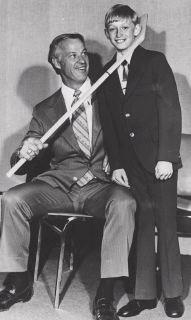 The first major article about Gretzky found its way into the Toronto Telegram on October 28, 1971, when reporter John Iaboni was sent to cover the Nadrofsky Steelers' blossoming star.
The first major article about Gretzky found its way into the Toronto Telegram on October 28, 1971, when reporter John Iaboni was sent to cover the Nadrofsky Steelers' blossoming star.At the end of the game an eight-year old spectator approached Iaboni and asked, "'Are you going to write a book on Wayne Gretzky? He's good you know.'"
While the book idea was a little farther off, his greatness was already shining through. Gretzky finished that season with 378 goals in 68 games.
By the age of 17, he was tearing up the Ontario Hockey League, scoring 182 points in 64 regular season games for the Sault Ste. Marie Greyhouds.
For most of his childhood, Gretzky had worn Howe's No. 9, in honor of his hero, Gordie Howe, then the NHL's all time scoring leader. It was Greyhounds GM "Muzz" McPherson who convinced Wayne Gretzky to wear the unconventional number 99 on his jersey, since No. 9 was unavailable.
A year before he would have been eligible for the NHL draft, 17-year-old Wayne Gretzky signed up with the Indianapolis Racers of the WHA in 1978 for an unprecedented $825,000. After just 8 games, however, the hotshot prospect found himself traded to Edmonton, along with Peter Driscoll and Eddie Mio, in exchange for cash. The Racers were in deep financial trouble, and the move had to be made.
In the WHA's last season Gretzky led the Oilers to the championship finals, where they lost to the Winnipeg Jets. Gretzky finished third in league scoring with 110 points. Remember, most kids his age are in high school, and this guy was challenging for the scoring race!
 Edmonton was one of four WHA franchises that were absorbed into the NHL in 1979. And in his first season in the National Hockey League, Gretzky became the youngest player ever to crack the 50-goal barrier. He equaled Marcel Dionne's 137 points. While he was deemed ineligible for the Calder trophy because of his affiliation with the WHA, Gretzky locked up the Hart trophy for the most valuable player.
Edmonton was one of four WHA franchises that were absorbed into the NHL in 1979. And in his first season in the National Hockey League, Gretzky became the youngest player ever to crack the 50-goal barrier. He equaled Marcel Dionne's 137 points. While he was deemed ineligible for the Calder trophy because of his affiliation with the WHA, Gretzky locked up the Hart trophy for the most valuable player.In the 1981-82 campaign, Gretzky obliterated the record for goals in a season with an unthinkable 92 and points in a season with 212. No one else had ever broken the 200-point barrier, or even come close, but Gretzky would do it three more times. Even more impressive was his breach of hockey's mythical 50-goals-in-50-games barrier. Only two other players had ever achieved that milestone — Rocket Richard and Mike Bossy — and it took both the full 50 games to do it; Gretzky scored number 50 in the 39th game of the season.
Teaming up Gretzky with the Finnish finisher, Jari Kurri, on the first line and Mark Messier and Glenn Anderson on the second, combined with offensively-gifted defenseman Paul Coffey, coach Glen Sather could send waves of offense at opposing teams the likes of which the NHL had never seen. Propelled by four 100-point scorers, Edmonton tallied an unprecedented 424 goals in the 1982-83 season.
The high flying Oilers made it all the way to the 1983 Stanley Cup finals where they faced the 3 time defending Cup champs, the New York Islanders. The Oilers were about to be taught a lesson - losing in 4 straight games as the Isles made it 4 straight Cup victories.
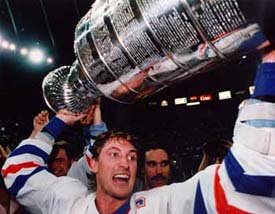
In the next year's rematch, however, the Oilers defeated the Islanders in five games, ending one dynasty and starting one of their own. The momentum spilled over into the 1984-85 season when they demolished Philadelphia in just five games to take their second Stanley Cup.
It seemed like no one in the league could defeat Gretzky's Oilers of the mid-80s, except themselves. A wayward pass by Edmonton defenseman Steve Smith into his own net sent the team home early during the 1986 playoffs, interrupting what should have been a five-year championship dynasty, as the Oilers would redeem themselves with the 1987 and 1988 championships.
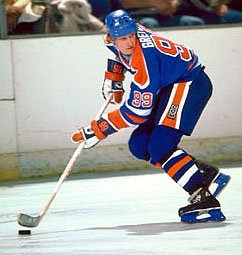
And throughout the Oilers' glory years, Gretzky kept re-writing the record books. During the 1985-86 season, Gretzky set the current mark with 215 points, including a record-shattering 163 assists. In fact, Gretzky won the Art Ross trophy as scoring leader every year between 1981 and 1987 and two more times after that.

Gretzky of course was no stranger to international hockey competition either. Representing Canada in 4 Canada Cup tournaments, the 1978 World Junior championships, the 1996 World Cup and the 1998 Olympics, but his greatest performance on any stage came in the 1987 Canada Cup.
Gretzky captained Team Canada against the mighty Soviet Union - led by the vaunted KLM line — featuring Igor Larionov, Sergei Makarov and Vladimir Krutov. Gretzky led all scorers with 18 points while playing what he himself admitted was the best hockey of his career.
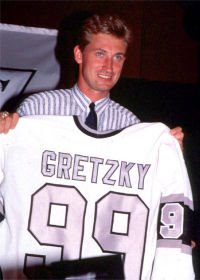 August 9, 1988 is considered by many Canadians to be the lowest day in the country's history. On that date, the Oilers traded Wayne Gretzky, along with Mike Krushelnyski and Marty McSorley to the Los Angeles Kings for Jimmy Carson, Martin Gelinas, three first round picks and cash.
August 9, 1988 is considered by many Canadians to be the lowest day in the country's history. On that date, the Oilers traded Wayne Gretzky, along with Mike Krushelnyski and Marty McSorley to the Los Angeles Kings for Jimmy Carson, Martin Gelinas, three first round picks and cash.The major reason for the trade was the cash. Struggling financially, Oilers' owner Peter Pocklington jumped at the $15 million that Kings owner Bruce McNall showed him.
As Canada mourned, Los Angeles partied. Gretzky - and Hockey -had gone Hollywood. By the end of Gretzky's 7 1/2 season tenure with the Kings, the Great One had brought enough popularity to hockey in Southern California to blaze the trail for two more teams, the San Jose Sharks and the Anaheim Mighty Ducks. In reality Gretzky brought the game to such a high level in the American sunbelt that the NHL also saw teams in Dallas, Miami, Tampa Bay and countless minor league teams throughout the USA.
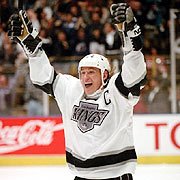 Gretzky's greatest moment as a King came in 1993 when he carried the Kings to the 1993 Finals. That playoffs also saw Gretzky play what he called his greatest game in NHL competition. In Game 7 of the conference finals, Gretzky scored a hat trick, including the game winner, in a 5-4 victory over the heavily favored Toronto Maple Leafs. However, the Kings couldn't continue their magic in the Finals, falling to the Montreal Canadiens.
Gretzky's greatest moment as a King came in 1993 when he carried the Kings to the 1993 Finals. That playoffs also saw Gretzky play what he called his greatest game in NHL competition. In Game 7 of the conference finals, Gretzky scored a hat trick, including the game winner, in a 5-4 victory over the heavily favored Toronto Maple Leafs. However, the Kings couldn't continue their magic in the Finals, falling to the Montreal Canadiens.While Gretzky never got his named etched on the Cup as a member of the Kings, he did continue to rewrite the record book. On October 15, 1989, Gretzky surpassed Gordie Howe's NHL-record 1,851 points. It took Howe 26 years to accomplish that. It took Gretzky less than 11. Fittingly the record was surpassed in Edmonton. Even Howe's record 801 goals weren't safe: Gretzky scored number 802 against the Canucks on March 23, 1994.
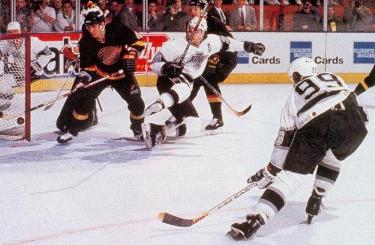
By the middle of the 1995-96 season, it was obvious that the Kings didn't have the talent to make the playoffs, let alone contend. Gretzky asked to be traded and received his wish. He found himself playing alongside good friend Brett Hull, on the St. Louis Blues.
Gretzky was also initially happy to be reunited with Mike Keenan, with whom he had great success in the Canada Cup tournaments. However by this time the tyrannical Keenan had gone over the edge in his drive more power, and soon turned Gretzky, like Hull and many more, against him. During one playoff game, Keenan embarrassed Gretzky in front of his teammates in between periods. Gretzky went on to tally five assists the next game, but the Blues were still eliminated from the playoffs.
Gretzky left St. Louis, largely because of Mike Keenan, as a free agent. He took his greatness to the New York Rangers, where he was reunited with his old buddy Mark Messier.
The much celebrated reunion was short lived. After just one season, Messier left for bigger bucks in Vancouver. Gretzky however stayed in New York, quietly signing an extension with the team for less than market value.
Although it wasn't a storybook script, Gretzky fulfilled a lifelong dream in 1998 when he represented Canada in the 1998 Olympics. However Gretzky was not the Gretzky of old by this point. In fact Gretzky wasn't even named as team captain. Canada ran into the best goalie in the world, the Czech Republic's Dominik Hasek, in the semifinal game. Canada finished without a medal; Gretzky finished without a goal.
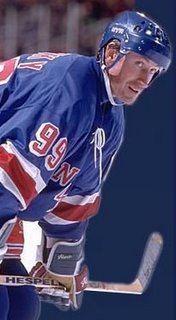 During these otherwise unspectacular Ranger seasons, Gretzky hit two more major milestones. On October 26, 1997, Gretzky recorded two assists in Anaheim to raise his career total 1,851, more than Gordie Howe — the second highest total in NHL history — had points. Then in March of 1999 he scored his 1,072nd goal as a pro, surpassing yet another Gordie Howe record. Suddenly there weren't any records left to shoot for.
During these otherwise unspectacular Ranger seasons, Gretzky hit two more major milestones. On October 26, 1997, Gretzky recorded two assists in Anaheim to raise his career total 1,851, more than Gordie Howe — the second highest total in NHL history — had points. Then in March of 1999 he scored his 1,072nd goal as a pro, surpassing yet another Gordie Howe record. Suddenly there weren't any records left to shoot for.The man who once scored 92 goals during the 1981-82 season, however, could only manage nine during the 1998-89 campaign. And when Gretzky was sidelined by a painful neck injury, the Rangers went 6-3-3 and temporarily moved back into the playoff race. Fans bombarded call-in shows suggesting that the Great One should retire. For the first time in a career built on proving naysayers wrong, Gretzky started to listen to his detractors.
Gretzky was clearly but a shadow of his former self, yet he was still better than most. He showed moments of greatness that no one else could. In the 1999 All Star game Gretzky recorded a goal and two assists and was named as the game's MVP. In his first and only game in Nashville he showed a rare sellout crowd the wonders of Gretzky by scoring 5 assists.
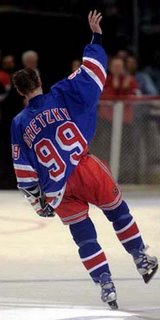 No. 99 left the game after 20 seasons, taking 61 NHL records with him. Among them: 92 goals in a single season, 163 assists in a single season, 215 points in a single season, a 51-game points streak that's every bit as impressive as Joe DiMaggio's 56-game mark in baseball, 2857 career points, and 1, 072 professional goals. He won every Hart Trophy from 1980 to 1987 (and another in 1989) as the league's MVP and took home ten Art Ross Trophies as the league's scoring leader. While captaining the Oilers to four Stanley Cups, Gretzky also took home two Conn Smythe trophies as the most valuable player in the playoffs.
No. 99 left the game after 20 seasons, taking 61 NHL records with him. Among them: 92 goals in a single season, 163 assists in a single season, 215 points in a single season, a 51-game points streak that's every bit as impressive as Joe DiMaggio's 56-game mark in baseball, 2857 career points, and 1, 072 professional goals. He won every Hart Trophy from 1980 to 1987 (and another in 1989) as the league's MVP and took home ten Art Ross Trophies as the league's scoring leader. While captaining the Oilers to four Stanley Cups, Gretzky also took home two Conn Smythe trophies as the most valuable player in the playoffs.Until Wayne came along, we didn't know how great great could be. #99 redefined greatness. But is Wayne Gretzky the greatest athlete of the 20th century?
Needless to say, hockey fans think so! No athlete in any sport has dominated the way Gretzky has. Need proof? Then consider this:
Gretzky's 92 goals in 1981-82 topped Phil Esposito's previous record by 16, and his 212 points that season eclipsed Esposito's old mark by 60. Gretzky's 163 assists in 1985-86 surpassed Bobby Orr's standard by 61.
The Elias Sports Bureau has determined his 212 points in 1981-82 are the equivalent of 85 home runs -- 24 more than Roger Maris hit in 1961 or 14 more than Mark McGuire in 1998; a 2,941-yard NFL rushing season (Eric Dickerson holds the record with 2,105 in 1984) or 67 touchdown passes by a quarterback (Dan Marino holds the standard at 48, also in '84). Wilt Chamberlain dwarfed previous NBA scoring leaders, but arguments raged during his day as to whether he or Bill Russell was the more dominant player.
A case can be made that no one ever has done in any sport what Gretzky has accomplished in hockey. And when you consider the wider impact of one player's career upon a sport, only Babe Ruth and Michael Jordan rank with Gretzky.
In hitting 59 home runs with a livelier ball in 1921 and raising the record by a staggering 25, Ruth also drastically elevated standards of excellence and excitement. The Babe, too, was the object of a blockbuster transaction: The Red Sox sold him to the Yankees for $100,000 and a $300,000 loan. His magnetism helped baseball recover from a betting scandal and inspired the building of a stadium twice the size of others in that era. He was the dominant player on baseball's dominant team, winning four World Series and seven American League pennants.
Michael Jordan is universally hailed as the greatest athlete of the 20th century, but realistically he doesn't deserve to be on the same level as Wayne. Yes, Michael was perhaps the most gifted and talented athlete of our time, but you could easily say he wasn't the greatest basketball player let alone athlete. Wilt Chamberlain's hoop exploits dwarf that of Jordan's.
Picture Hank Aaron as not only baseball's all-time home run leader, but its single-season homer king and all-time hits leader as well. That's Gretzky's place in hockey.
When it comes to debating who is the best hockey player of all time, it generally boils down to one of three players: Gretzky, Bobby Orr and Gordie Howe.
Orr revolutionized the way defense could be played and established significantly higher statistical standards for excellence at that position. It can be argued that Orr carried the puck more than Gretzky and broke up a lot of rushes, making him a more effective all-around player than The Great One. But Orr's career, cut drastically short by knee injuries, produced just 915 points.
Unquestionably, Howe played the majority of his career in a much tighter checking era. But the fact that jobs were more competitive in the six-team league doesn't necessarily mean the level of play was, too. Bigger, faster, and better athletes, and the influx of European- and American-born players, and equipment advances make today's NHL just as competitive -- but higher scoring -- than the pre-expansion league.


